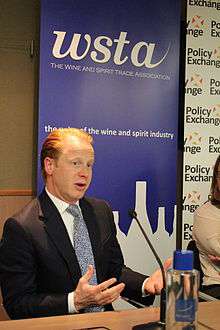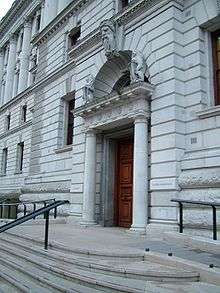Paymaster General
| Her Majesty's Paymaster General | |
|---|---|
|
Arms of Her Majesty's Government | |
| Office of HM Paymaster General | |
| Style | The Right Honourable |
| Appointer | Elizabeth II |
| Inaugural holder | Henry Parnell |
| Formation | 27 April 1836 |
| Website | HM Paymaster General [archived version] |
.svg.png) |
| This article is part of a series on the politics and government of the United Kingdom |
|
|
|
|
Her Majesty's Paymaster General or HM Paymaster General is a ministerial position in the United Kingdom. The Paymaster General was formerly in charge of the Office of HM Paymaster General (OPG), which held accounts at the Bank of England on behalf of Government departments and selected other public bodies. Funds which were made available from the Consolidated Fund were then channelled into OPG accounts, from where they were used by the relevant body. OPG operated a full range of accounts and banking transaction services, including cheque and credit, BACS and CHAPS services for its customers via an electronic banking system. Integration of OPG accounts held with commercial banks was provided by the private company Xafinity Paymaster. However, in 2008, the government announced that the Office of the Paymaster General would be incorporated into a new body, the Government Banking Service,[1] which also provides banking operations for HM Revenue & Customs and National Savings and Investments. Following the Bank of England's decision to withdraw from providing retail banking services,[2] retail banking services for the GBS are provided exclusively by the Royal Bank of Scotland and Citibank,[3] although the Bank of England still plays a role in managing the government's higher level accounts.[4] The post is now therefore usually combined with another role.
When the post is held by a minister in HM Treasury it ranks third in the Treasury, after the Chancellor of the Exchequer and the Chief Secretary to the Treasury. The post was created in 1836 by the merger of the positions of Paymaster of the Forces, Treasurer of the Navy, Paymaster and Treasurer of Chelsea Hospital and Treasurer of the Ordnance. From 1848 to 1868, the post was held concurrently with that of Vice-President of the Board of Trade.
The longest-serving holder of the post was Dawn Primarolo, whose portfolio covered HM Revenue and Customs (formerly the Inland Revenue and HM Customs and Excise). The incumbent Paymaster General is Ben Gummer, who is also the Minister for the Cabinet Office.
List of Paymasters General
Victorian
- Sir Henry Parnell, Bt. 1836–1841
- Edward Stanley 1841
- Sir Edward Knatchbull, Bt. 1841–1845
- Bingham Baring 1845–1846
- Thomas Babington Macaulay 1846–1848
- Granville Leveson-Gower, 2nd Earl Granville 1848–1852
- Edward Stanley, 2nd Baron Stanley of Alderley 1852
- Charles Abbot, 2nd Baron Colchester 1852
- Edward Stanley, 2nd Baron Stanley of Alderley 1853–1855
- Edward Pleydell-Bouverie 1855
- Robert Lowe 1855–1858
- Richard Hely-Hutchinson, 4th Earl of Donoughmore 1858–1859
- Algernon Percy, Lord Lovaine 1859
- James Wilson 1859
- William Cowper 1859–1860
- William Hutt 1860–1865
- George Goschen 1865–1866
- William Monsell 1866
- Stephen Cave 1866–1868
- Frederick Hamilton-Temple-Blackwood, 1st Earl of Dufferin 1868–1872
- Hugh Childers 1872–1873
- William Adam 1873–1874
- Stephen Cave 1874–1880
- David Plunket 1880
- George Glyn, 2nd Baron Wolverton 1880–1885
- Frederick Lygon, 6th Earl Beauchamp 1885–1886
- Thomas Hovell-Thurlow-Cumming-Bruce, 5th Baron Thurlow 1886
- Frederick Lygon, 6th Earl Beauchamp 1886–1887
- Adelbert Brownlow-Cust, 3rd Earl Brownlow 1887–1889
- Victor Child Villiers, 7th Earl of Jersey 1889–1890
- Robert Windsor-Clive, 1st Baron Windsor 1890–1892
- Charles Seale-Hayne 1892–1895
- John Hope, 7th Earl of Hopetoun 1895–1899
- Charles Spencer-Churchill, 9th Duke of Marlborough 1899–1902
Edwardian and wartime
- Savile Crossley 1902–1905
- Richard Causton (1st Baron Southwark after 13 July 1910) 1905–1910
- Ivor Guest, 1st Baron Ashby St Ledgers 1910–1912
- Edward Strachey, 1st Baron Strachie 1912–1915
- Thomas Legh, 2nd Baron Newton 1915–1916
- Arthur Henderson 1916
- Joseph Compton-Rickett 1916–1919
- Tudor Walters 1919–1922
- Office vacant 1922–1923
- Neville Chamberlain 1923
- William Joynson-Hicks 1923
- Archibald Boyd-Carpenter 1923–1924
- Harry Gosling 1924
- Office vacant 1924–1925
- George Sutherland-Leveson-Gower, 5th Duke of Sutherland 1925–1928
- Richard Onslow, 5th Earl of Onslow 1928–1929
- Sydney Arnold 1929–1931
- Office vacant 1931
- Tudor Walters 1931
- Ernest Lamb, 1st Baron Rochester 1931–1935
- Robert Hutchison, 1st Baron Hutchison of Montrose 1935–1938
- Geoffrey FitzClarence, 5th Earl of Munster 1938–1939
- Edward Turnour, 6th Earl Winterton 1939
- Office vacant 1939–1940
- Robert Gascoyne-Cecil, Viscount Cranborne 1940
- Office vacant 1940–1941
- Maurice Hankey 1941–1942
- William Jowitt 1942
- Frederick Lindemann, 1st Baron Cherwell 1942–1945
Post-War
- Office vacant 1945–1946
- Arthur Greenwood 1946–1947
- Hilary Marquand 1947–1948
- Christopher Addison 1948–1949
- Gordon Macdonald, 1st Baron Macdonald of Gwaenysgor 1949–1951
- Frederick Lindemann, 1st Baron Cherwell 1951–1953
- George Douglas-Hamilton, 10th Earl of Selkirk 1953–1955
- Office vacant 1955–1956
- Walter Monckton 1956–1957
- Reginald Maudling 1957–1959
- Percy Mills 1959–1961
- Henry Brooke 1961–1962
- John Boyd-Carpenter 1962–1964
- George Wigg 1964–1967
- Office vacant 1967–1968
- Edward Shackleton 1968
- Judith Hart 1968–1969
- Harold Lever 1969–1970
- David Eccles 1970–1973
- Maurice Macmillan 1973–1974
- Edmund Dell 1974–1976
- Shirley Williams 1976–1979
- Angus Maude 1979–1981
- Francis Pym 1981
- Cecil Parkinson 1981–1983
- Office vacant 1983–1984
- John Gummer 1984–1985
- Kenneth Clarke 1985–1987
- Peter Brooke 1987–1989
- Malcolm Sinclair, 20th Earl of Caithness 1989–1990
- Richard Ryder 1990
- John Ganzoni, 2nd Baron Belstead 1990–1992
- John Cope 1992–1994
- David Heathcoat-Amory 1994–1996
- David Willetts 1996
- Michael Bates 1996–1997
- Geoffrey Robinson 1997–1999
21st century
| Name | Portrait | Term of office | Concurrent office(s) | Political party | Prime Minister | |||
|---|---|---|---|---|---|---|---|---|
| Dawn Primarolo | 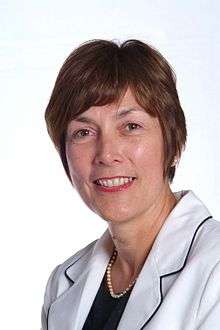 |
4 January 1999 | June 2007 | Labour | Tony Blair | |||
| Tessa Jowell | 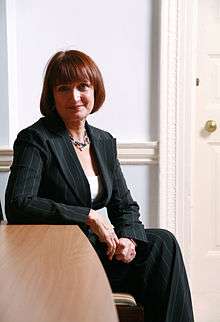 |
28 June 2007 | May 2010 | Minister for the Olympics Minister for the Cabinet Office (from 5 June 2009) Minister for London (until 3 October 2008; from 5 June 2009) |
Labour | Gordon Brown | ||
| Francis Maude |  |
12 May 2010 | May 2015 | Minister for the Cabinet Office | Conservative | David Cameron (I) | ||
| Matthew Hancock | 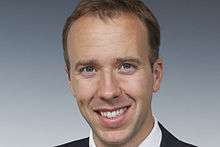 |
11 May 2015 | 14 July 2016 | David Cameron (II) | ||||
| Ben Gummer | 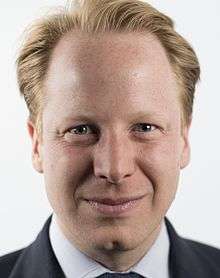 |
14 July 2016 | Incumbent | Conservative | Theresa May | |||
References
- ↑ Angela Eagle launches the Government Banking Service - HM Treasury Press Release, 22 May 2008
- ↑ Important changes to banking arrangements for the Insolvency Services Account - insolvency.gov.uk Archived October 30, 2010, at the Wayback Machine.
- ↑ Introduction to Government Banking Service - HMRC
- ↑ Government Banking Service - Department of Works and Pensions
External links
- Office of the Paymaster General - archived version, as of June 2008. Since then the OPG website redirects to the new GBS site:
- Government Banking Service
